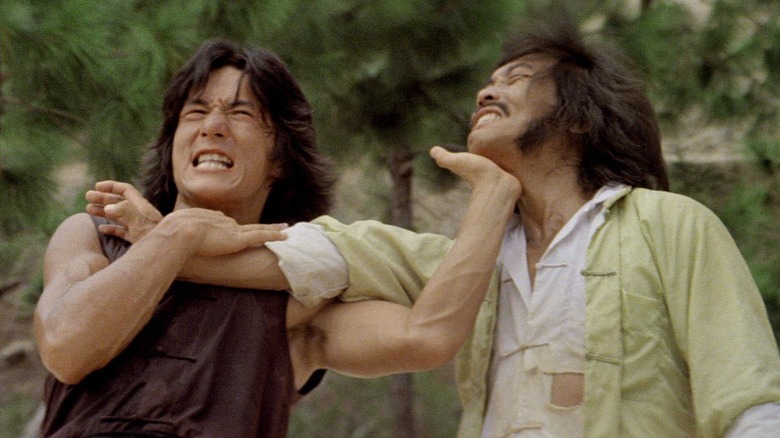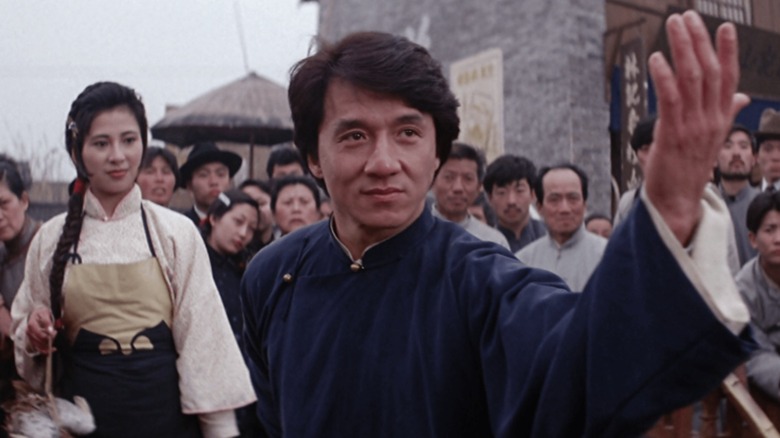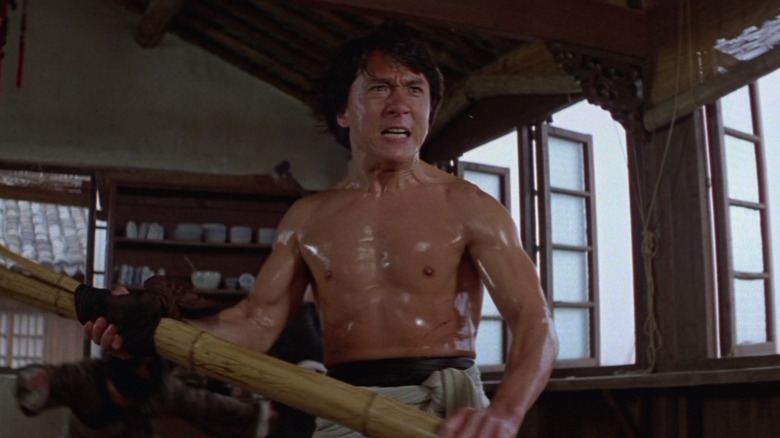How Jackie Chan's Disappointment In Drunken Master Changed The Sequel
If you love martial arts films, then the 1978 film "Drunken Master" should be on your watchlist. The film is all-time martial arts classic, starring Jackie Chan as Chinese folk hero Wong Fei-Hung. It put Jackie Chan on the map in Asia, the first step towards him becoming the superstar he is today.
"Drunken Master" was the second collaboration between Chan and director Yuen Woo-ping, following "Snake in the Eagle's Shadow," which released earlier that year. It's credited with not only popularizing the Drunken Boxing style of Chinese martial arts, it's also one of the earliest showcases of Chan's specific flavor of action comedy. The popularity of "Drunken Master" and his subsequent films saw Chan taking on the role of creative lead for "Drunken Master II," where he was able to fix some of the issues he had with the original's overall presentation.
Woo-ping would follow this success with many other classics, including "Iron Monkey" and "Tai Chi Master," before finding international success as the action choreographer of "The Matrix" and "Crouching Tiger, Hidden Dragon." "Drunken Master" not only blew up the careers of two veterans in action filmmaking, it also inspired countless other movies, games, and television shows.
Keeping the kids in mind
Yuen Woo-Ping would not return to direct the sequel, however. "Drunken Master II," also known as "The Legend of Drunken Master," was released many years later in 1994. By that point, Chan was a bonafide star, having written, directed, and starred in "The Fearless Hyena," "Police Story," and "Police Story II." When the time came for a sequel to "Drunken Master," it only made sense for Chan to have a greater hand in the direction of the film. While "Drunken Master II" was directed by Lau Kar-leung, Chan was able to steer the story in a direction that he felt better suited his vision.
1978's "Drunken Master" featured Chan as a younger, impetuous Wong Fei-Hung who learns martial arts as a way to grow emotionally. It's a deft mix of comedy and martial arts action, with every fight showcasing Chan's comical expressions, amazing moves, and wildly over-the-top pratfalls. The sequel came far later and features an older Fei-Hung struggling with a temper and a style of kung fu that requires the consumption of copious amounts of alcohol. Chan wanted to use the later film to present a better message for younger viewers.
"When I saw 'Drunken Master' after I became popular — it is a great movie, but I was a little disappointed," Chan explained in an interview for the 35th anniversary of the first film posted at Films Extras. "Because I taught kids about drinking liquor and I hit people through the movie. So when I directed the last half of 'Drunken Master 2,' I adjusted the wrong parts of the story right away. Too much drinking and fighting are wrong."
There's no true Drunken Master III
While Fei-Hung has to drink to unlock the peak of his style of kung fu in "Drunken Master II," his demeanor and general drunkenness are treated as a flaw in the film. Picking fights is the impetus for the film's plot, with Wong's family items being switched with those being smuggled out of China by antagonistic British officials during a duel that didn't need to happen. Likewise, Fei-Hung's drunkenness gets him into more fights and almost causes his father to lose his land.
What hasn't changed is the general craft of the film and Chan's martial arts prowess. With the weight of experience, the older Chan is faster and more precise in the sequel. He's also more adept at playing up the physical comedy of a situation, like an early fight scene where Fei-Hung is desperately looking for more things to drink and becoming more unorthodox in his style as he succeeds. The final fight between a more driven Fei-Hung, who is pushed to drink by necessity, and a taekwondo-wielding henchman played by Ken Lo is a brutal ballet of wild kicks and ethyl alcohol. It's also one of the best fights ever put to film. As a kid who grew up on these films, I have to say I missed all of the messaging about not drinking amidst the excellent fight scenes. Sorry, Mr. Chan.
Later in the interview, Chan notes that the changes made to "Drunken Master II" were indicative of his overall feelings about filmmaking. While the martial arts and comedy remain at the forefront, his later films present more wholesome themes of friendship, family, and loyalty. Kicking people is cool, but you don't have to be a bad guy to do it.


